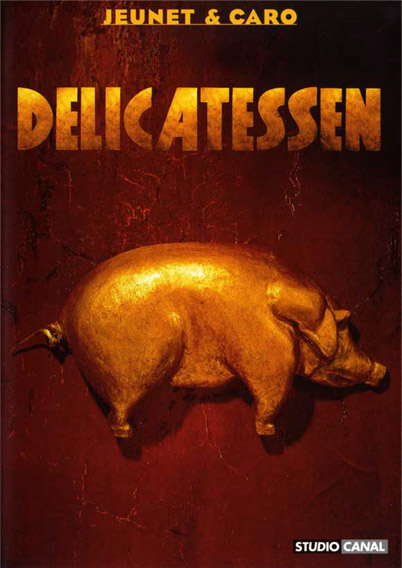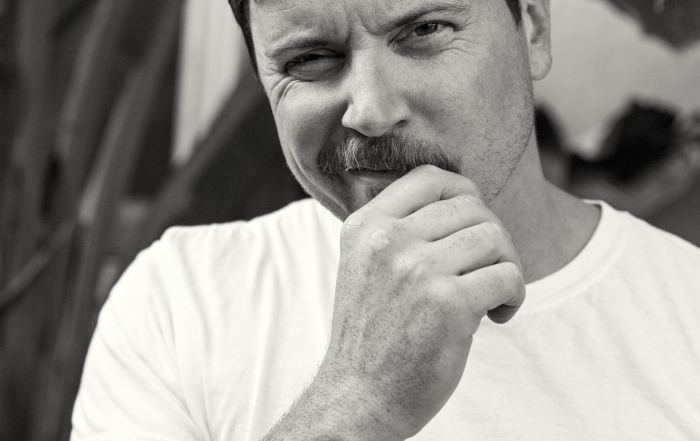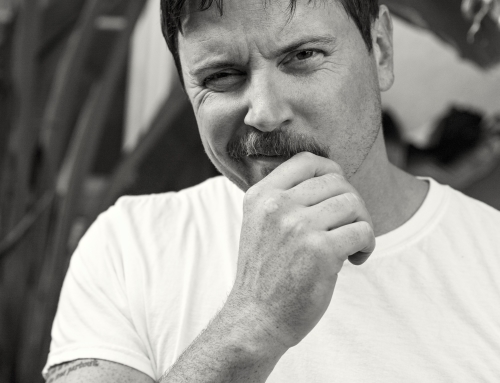FILLER: And what about the whole post-apocalyptic cannibalism plot, what did you make of that? It was pretty out there.
JS: Thinking about cooking humans is weird.
MS: Yeah, very weird.
JS: I think if I was starving, I would eat human. And I can’t say, if I wasn’t starving, that I wouldn’t eat it…just to try it.
MS: Oh yeah?
JS: I think I would taste it if the circumstances were right…if I knew that no one had been innocently slaughtered to provide the meat…someone dying of natural causes or something, and they signed a contract that said like: “I hereby donate my body to foodies.” And if I knew I wouldn’t get diseases from it.
MS: Well, it would have to be a grass fed, free-range human. (Laughing.) Clearly.
JS: Of course. But fast food humans could be good too…like Americans.
MS: That would be the pork belly… (Laughing.)
***The waitress delivers a meatball to the table.***
JS: There’s so much potential. (Laughing.)
FILLER: Given the unusual topic of conversation watching the film leads to, not to mention it’s cult status, does it seems fair to say that “Delicatessen” is not your typical drama?
JS: The movie was great. I get really annoyed when I go to Hollywood movies and they’re all exactly the same.
MS: It was smart too. Even the little details, like when they locked themselves in the washroom, and then right away, it was clear to him that there was only one way to escape…one thing to do…
JS: Pull a MacGyver…
MS: Yep, the only thing to do was flood the entire bathroom. Just to think of even writing that is pretty smart, I think.
JS: And that woman who kept trying to commit suicide, but failing…that was great. There was just so much weirdness underlining everything.
MS: Even his clown makeup…oh and the vegetarians…they were something. (Laughing.)
JS: Yeah, and there were these little scenes, that didn’t move the plot forward…
MS: At all…
JS: They were just cool to watch.
MS: Like the bed scene…there were two bed scenes that were like…orchestra scenes.
JS: I feel like sometimes, North American cinema is all about being on the edge of your seat, but what’s wrong with just being…intrigued? Or confused?
MS: So then would you say that it was a cerebral film? It was also…I don’t want to say it was slapstick, but…
JS: There were elements of slapstick. I don’t know if it was cerebral, it was just more about feeling sensations.
FILLER: Does it make sense that chef Dufresne chose Delicatessen as his “food” film?
MS: It totally makes sense that he chose that film. It’s a creative movie; he’s a creative guy. And he just seems…kind of weird, in a good way (laughing), and it seems like a movie he would like. I mean, I thought it would have more to do with food…I guess though, they only ate humans…
JS: I thought there might be more cooking in general…
MS: Like could you make pastrami?
JS: I’m so glad we’re going back to that. Yeah pastrami…
MS: I don’t know why we’re so weirdly fascinated by the possibility of them cooking humans in the movie right now! (Laughing.) Head cheese…
***Conversation is interrupted by the waitress, dropping off oysters.***
FILLER: What did you think of what the chef had to say when asked about his own cooking?
MS: I think it’s always hard to talk about your own food. That’s why I loved what he said: “I cook hot food that tastes good.”
JS: Asking someone “why” they cook the way they do…it can’t always be explained in simple turns. They’re just doing their thing.
MS: I respect him more for saying what he said, rather than: once when he was eleven he saw his uncle kissing someone, and he could smell eggs cooking in the background, and that’s what inspired his eggs Benedict. You know? Food should just taste good. And then his brain, I mean, it just works so that he has to have a scientific approach.
FILLER: Overall, what were your thoughts on the evening’s screening?
JS: The movie made me regret that I haven’t…
MS: Tasted human? (Laughing.)
JS: No (laughing), it made me regret not watching more French cinema. I’m going to start watching it.
MS: Have you seen Amélie? That’s the same director.
JS: Yeah, but a long time ago. It was the same director?
MS: Yeah…but a very different movie.
FILLER: Do you agree with Chef Dufresne’s comments about the presence of a French love of food in the film?
JS: I didn’t notice that all. I didn’t notice a love of food…because it was all about food as a necessity.
MS: That’s true…
JS: And the moral implications of what you’re eating, and that’s a good conversation to have. But it wasn’t about a love of food…at all.
MS: I mean, there were those commercials, like some cheese spread commercial…
JS: And there was also the guy who lived with all the frogs; it looked like what he was having was really delicious.
MS: Well it was escargot and frog legs, two French staples.
JS: He was the foodie in the movie.
MS: All he needed was some foie gras. And what did he say? “Every man for himself.” He did it.
FILLER: What do you think of the “Food on Film” series and the concept behind it?
JS: I love food movies.
MS: But there aren’t really any great food movies…
JS: Ratatouille?
MS: Ratatouille is probably the best food movie. (Laughing.)
JS: I mean Chocolat is a food movie…
MS: What else…there really are a lot of bad ones…like No Reservations with Catherine Zeta-Jones and Two-Face.
JS: Who?
MS: Aaron Eckhart.
JS: Oh…Jiro Dreams of Sushi…
MS: That’s a documentary though….a lot of food films are documentaries, and those are good. I mean, I like it though that all the movies in the series aren’t specifically about food. I think it tells you more about the person. The fact that Wylie chose that movie says a lot about him. Without getting too deep…I didn’t see into his soul or anything, but I just think it not only takes a certain type of person to watch and like that movie, but also a unique person to be excited to share it with a large group of people. It was great.
<< BACK
Bonus: Recipe by “Food on Film” presenter chef Jonathan Waxman | NEXT >>















